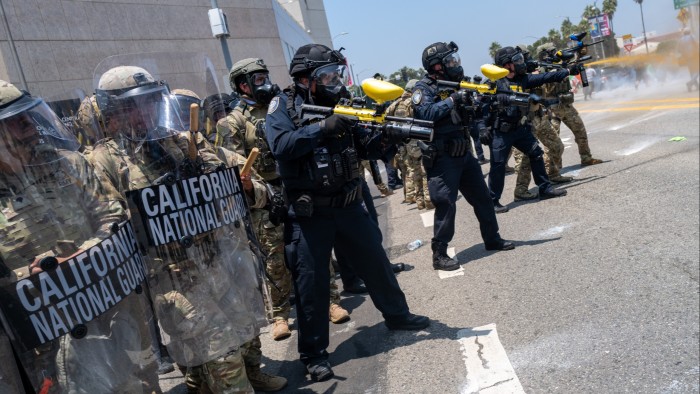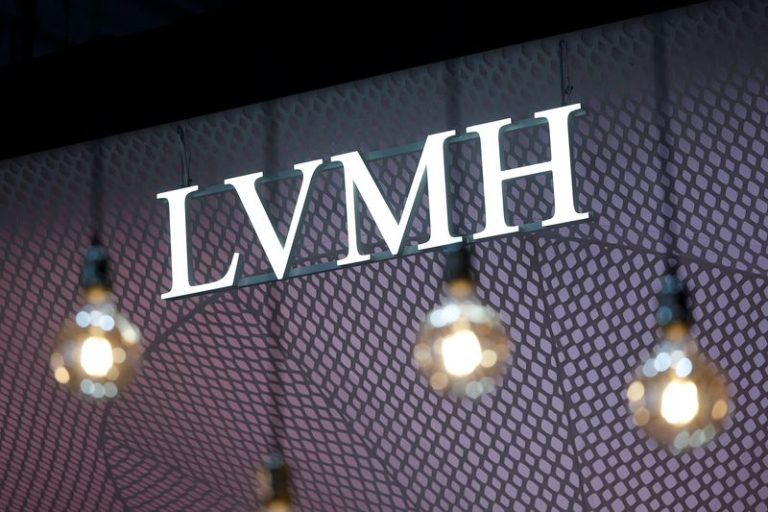By calling on troops to suppress protests in Los Angeles on Sunday, Donald Trump has shown he is willing to put the country on a war footing — and test the boundaries of executive power — to achieve his goals.
For the first time in decades, the National Guard was deployed against citizens on domestic soil against the wishes of local law enforcement, using a rarely invoked law designed to help the US fight off a foreign invasion. A US president last deployed a state’s National Guard without being asked by its governor in 1965, when Lyndon Johnson sent troops to protect civil rights demonstrators in Selma, Alabama.
Pete Hegseth, the defence secretary, even threatened to send in the marines to quell the unrest over raids against suspected illegal migrants. That would require invoking the Insurrection Act, which last happened 30 years ago during the riots that erupted in Los Angeles after the police who beat Rodney King were acquitted.
The deployment of the National Guard in the second-largest US city, one that is largely liberal, was “clearly done as an authoritarian show of strength”, said Ryan Enos, a professor of government at Harvard University.
“There is no policy reason [why the administration] should be targeting places in Los Angeles as opposed to places in red states.”
The deployment is the latest effort by the Trump administration to test the limits of presidential authority and force Democrat-run states to follow federal edicts. Some scholars warn these efforts are increasingly in open defiance of political convention and the US constitution.
In the space of a few days, Trump has ordered an investigation into his former presidential rival Joe Biden and officials in the previous administration, and threatened to stop federal funds flowing to California.
The president floated the idea of cancelling government contracts held by businesses belonging to his former ally Elon Musk, and warned there would be “very serious consequences” if the billionaire used his war chest to back Democratic candidates.
Trump’s most eager lieutenants have issued similar threats. Vice-president JD Vance suggested the spectacle of “foreign nationals with no legal right to be in the country waving foreign flags and assaulting law enforcement” could be legally defined as an invasion.
Stephen Miller, the architect of the White House’s immigration policy, declared that the choice before the country was to “deport the invaders, or surrender to insurrection”. He endorsed a post which called for mass deportations no matter “what it costs”, and which concluded: “Nothing else matters if this isn’t handled.”
On Fox News, border tsar Tom Homan suggested the Department of Justice would investigate Democratic lawmakers — including House minority leader Hakeem Jeffries — who called for Immigration and Customs Enforcement agents not to conceal their faces behind masks when conducting raids.
Justifying the deployment of troops in Los Angeles, homeland security secretary Kristi Noem claimed that ICE agents were merely going after the “worst of the worst” — criminal aliens embedded in otherwise law-abiding communities.
But a report by the conservative-leaning Washington Examiner last week claimed Miller had castigated ICE’s high command for merely pursuing criminals, and exhorted them to round up all undocumented migrants. ICE denied this.
The broad scope and haphazard nature of the sweeps by ICE agents over the past few days was highlighted by the mistaken arrest of a US marshal in Arizona, who officials admitted had merely “fit the general description of a subject being sought by ICE”.
The White House did not immediately respond to a request for comment.
On Saturday, White House press secretary Karoline Leavitt defended the operations as “essential to halting and reversing the invasion of illegal criminals into the United States.”
She added that “the Commander-in-Chief will ensure the laws of the United States are executed fully and completely.”
Critics of the administration’s immigration crackdown say raids are indiscriminate by design.
“Obviously they know that mass deportations are going to be incredibly disruptive to these cities that have so many immigrants living in them,” said David Bier, director of immigration studies at the Cato Institute, a libertarian think-tank.
“They were fully expecting and hoping for this type of reaction,” he added, “because it’s good politics for them, and . . . further justifies both mass deportation and other power grabs.”
Andrew Weinstein, a lawyer who served as the Public Delegate to the UN under President Biden, said the escalation was part of a broader strategy.
“Whether it’s the unprecedented politicisation of the military, [the Trump administration’s] assault on higher education under the guise of combating the very real problem of rising antisemitism, or the expedited deportation of non-citizens without due process, it’s all a pretext to further an authoritarian agenda,” he said of recent moves by the White House.
“Each of these actions cracks the foundation of our democracy just a little bit more.”
For now, public support for Trump’s immigration crackdown appears to be holding up. A YouGov poll for CBS, conducted before the LA protests, found that 54 per cent of the country was in favour of the scheme. That figure dropped though when people were asked if they supported going after those who are not dangerous criminals.
In contrast to Trump’s first term, when defence secretary Mark Esper refused to send the military to quash Black Lives Matter protests, there has been no real opposition to the military deployment from members of the administration, or from Republicans in Congress.
For his part, Trump on Sunday did not see any reason to de-escalate.
“We’re going to have troops everywhere,” he told reporters. “We’re not going to let this happen to our country. We’re not going to let our country be torn apart like it was under Biden.”







